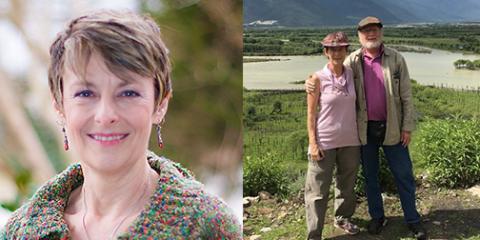
On August 20, Bonnie Brown will be joining COLSA as a professor and new chair of the Department of Biological Sciences. Brown, who comes to UNH from Virginia Commonwealth University, works in the field of ecological genetics. Her research involves metagenomics, which is the investigation of genetic material obtained directly from environmental samples, and the use of molecular markers to document dynamic genetic processes, and has important applications in the areas of conservation, restoration and aquaculture.
Brown recently arrived in Durham, and despite juggling the demands of getting settled, preparing for her new position and continuing her research, she took time to tell us a bit about herself, her work, and how a lifelong fascination began with a glass of water on a windowsill.
COLSA: What excites you most about coming to UNH and joining the Department of Biological Sciences?
Bonnie Brown: I am excited about the opportunity to facilitate DBS researchers' efforts to make advances that inform us about biological systems, neurobiology, ecology, behavior, and biodiversity; knowledge that is crucial for our understanding of how we function and interact with our environments and that can change our perception of how we ultimately fit in the Universe.
I believe that the cooperative nature of UNH makes it a perfect place for this kind of scholarship. For myself, I'm excited to be at a new academic home that values and promotes research themes that integrate animals, plants, and microbes because to me, these are the most challenging and interesting to study.
COLSA: What are you most looking forward to in the weeks and months ahead?
Brown: I'm looking forward to several things. First, learning about the professional goals and plans of each of the DBS faculty and graduate students so that I can find ways to advance their efforts. I look forward to hosting and attending events with faculty, staff, community stakeholders and neighbors so that I can begin my new life adventure in NH. I'm eager to go on field trips and to learn more about both the wet and dry environments near UNH and how these environments respond to human and global changes.
COLSA: What would you like your colleagues to know about you?
Brown: I'm a wife, mother of two college-age young adults, a SCUBA Divemaster and Tae Kwon Do 2nd degree black belt, amateur artiste, and teacher, who loves to travel and "fix things."
COLSA: Please describe your area of research in nontechnical language.
Brown: My field of research is ecological genetics. I bring samples from the field and investigate their DNA and RNA, molecules that we cannot see by eye, but that guide the function of all organisms on Earth and that can serve as innate tags, gauges of activity, and evolutionary markers.
Cataloguing and comparing genetic characters across populations and ecosystems provides insight into how organisms develop and interact. The kinds of questions I ask and answer relate to how human impacts affect the genetic "health" of natural populations and how we can restore natural populations and habitats.
COLSA: Why is this research important?
Brown: My work helps us to sustain populations that are harvested or affected by humans. It also helps us to understand and amend habitats and populations that are affected by climate change.
COLSA: What prompted you to focus on this area of research?
Brown: As a very young child, my mom taught me the concept of ecosystems by showing me the communities of protists and algae that developed in a glass of water she kept on the window sill. In elementary school, I was fascinated by the term "hypothesis" and found that the field of science gave unending opportunities to learn about life systems.
In high school, I found math and chemistry courses were the most engaging. As an undergraduate, invertebrate laboratory and ecology field trips were the most exciting course activities. As a graduate student, I found a way to integrate all of these areas and interests into a career studying ecological genetics.
COLSA: So far in your career, what do you consider to be your greatest achievement?
Brown: The value of many, if not most, ecological services is innate and therefore difficult to place a monetary value on so that worth can be justified in our capitalistic system. The capacity of oysters to filter estuarine waters is one such ecological service. Our work quantifying the capacity of oysters to sequester and transform nutrients was a game changer for aqua-culturists and conservation engineers. Our data are used by both groups to justify investment in raising shellfish for both food and restoration.
COLSA: Finally, if you weren't doing this, what would you be doing?
Brown: If not research and teaching at the Uni, I'd likely be raising Tridacna (giant clams) in the Philippine and Coral Seas.